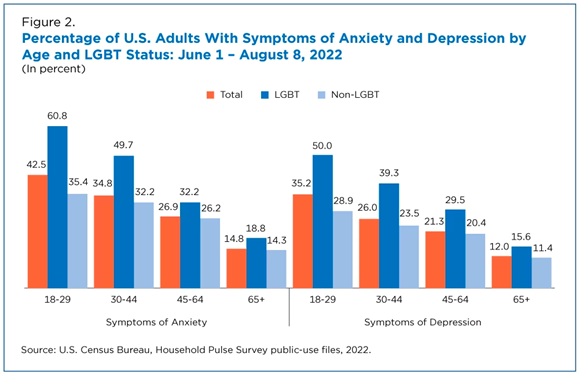Leading by Listening: How to Support the Mental Health Needs of Your LGBTQ+ Employees
 The LGBTQ+ community has and continues to bring value and unique perspectives to the workforce. Knowing that their employers stand by them can help employees feel safe in their workplace, which is critical to ensuring that the workforce has the diverse thoughts, perspectives and people we need for today’s world.
The LGBTQ+ community has and continues to bring value and unique perspectives to the workforce. Knowing that their employers stand by them can help employees feel safe in their workplace, which is critical to ensuring that the workforce has the diverse thoughts, perspectives and people we need for today’s world.
Part of standing by your LGBTQ+ employees means helping support their mental health. LGBTQ+ individuals have unique mental health needs. These individuals may face threats, violence, rejection and lack of acceptance in the community, as well as issues with accessing affirming care. We know from our own families and friendships that having an accepting, supportive workspace with validating mental health benefits also helps the loved ones of those in the community who already worry about their safety every day.
Providing inclusive health benefits is a critical way to support this community throughout the year and nurture a workplace that is inclusive and allows all employees to feel supported and have a sense of belonging – and this sense of belonging starts with HR professionals who are willing to come to the table and listen.
Understanding Mental Health Needs Among the LGBTQ+ Community
The most important way to support your LGBTQ+ colleagues’ mental health is to cultivate a workplace that is supportive and validating of everyone's identities. Employers must, first and foremost, listen to and truly hear the experiences of their employees and the types of support they need to feel safe.
It is well-documented in the medical community that LGBTQ+ individuals often experience threats to their physical and emotional safety. These incidents unfortunately make the LGBTQ+ community vulnerable to lasting trauma, which contributes to a higher prevalence of mental health conditions than in non-LGBTQ+ people.
Compared to non-LGBTQ individuals, LGBTQ people are more than two times as likely to live with a mental health condition, and 2.5 times more likely to have depression, anxiety or substance use problems.1 Another study found that 60% of LGBT young adults (18-29) had experienced symptoms of anxiety, while just 35% of the non-LGBT population had symptoms.2 These mental health experiences can be compounded by other factors such as race and socioeconomic status.

One’s workplace can affect a person’s mental health, too – in a 2022 Gallup study, just 17% of LGBT employees feel their employer cares about their well-being.3 Making sure that trauma-informed practices and care are part of the fabric of your company and your benefits is critical for your LGBTQ+ employees.
How Employers Can Move from Listening to Acting
In addition to ensuring an affirming and supportive workspace, providing access to affirming, trauma-informed therapy is one of the best ways for employers to show that they are listening to their LGBTQ+ employees’ needs. Many LGBTQ+ people have faced bias in their health care, which can lead them to avoid needed care in order to avoid discrimination. Indeed, 20% of transgender people reported avoiding health care interactions for this reason.4 To combat both outright and implicit biases, plan sponsors are looking for health plans that work to provide clinicians with training around how to administer affirming and validating care for people of all gender, sexual and racial identities.
At CVS Health, we encourage that our providers have training that enables them to best support the LGBTQ+ community, and we also partner with organizations like the Trevor Project and CenterLink to provide specialty information for supporting and caring for the LGBTQ+ community.
One way Aetna is supporting our members in finding affirming care and helping our providers practice the most evidence-based and supportive care is through Aetna’s LGBT Responsive Care Champion Badge Program. The program involves a set of free trainings that result in a cultural competency certification, earning providers a badge, which is viewable by members through our provider search tools to help ensure they receive culturally respectful care. Earners of this badge are able to identify the various underlying root causes of implicit and unconscious bias – especially as it relates to the LGBTQ+ community. These providers are equipped with the skills to integrate the practice of cultural humility into all clinical interactions, and incorporate regular self-assessment for bias into standard clinical practice to enhance the patient experience and improve outcomes for LGBTQ+ members.
In addition to looking at the work health plans are doing and partnering with them in these efforts, employers can implement additional supports such as Employee Assistance Programs, employee resource groups that provide support and education for our LGBTQ+ community and allies (which we’ve implemented at our own organization with our CVS Health Pride+ Colleague Resource Group), or flexible work arrangements to accommodate the mental health needs of all employees.
Supporting LGBTQ+ Employees All Year
To truly be an ally to the LGBTQ+ community, employers must ensure their benefits are meeting the mental health needs of all populations. While Pride Month may be coming to an end, this is just a reminder about the importance of HR professionals continuing the conversation about what employees need to feel safe being their complete self at work and beyond.
Deborah Fernandez-Turner, DO, FAPA, DFAACAP, Deputy Chief Psychiatric Officer, Aetna
LinkedIn: https://www.linkedin.com/in/deborah-fernandez-turner/
Jordan Pritzker, MD, MBA, FACOG, Medical Director, Aetna
LinkedIn: https://www.linkedin.com/in/jordan-pritzker-325b836/
1American Psychiatric Association, Diversity & Health Equity Education: Lesbian, Gay, Bisexual, Transgender and Queer/Questioning,” https://www.psychiatry.org/psychiatrists/diversity/education/lgbtq-patients.
2U.S. Census Bureau, “Mental Health Struggles Higher Among LGBT Adults Than Non-LGBT Adults in All Age Groups,” Dec. 14, 2022, https://www.census.gov/library/stories/2022/12/lgbt-adults-report-anxiety-depression-at-all-ages.html.
3 Gallup, “LGBT Employee Experiences; Here’s What We Know,” June 28, 2022, https://www.gallup.com/workplace/393983/lgbt-employee-experiences-know.aspx.
4 Kcomt, Luisa; Gorey, Kevin. M.; Barrett, Betty Jo.; McCabe, Sean Esteban. SSM – Population Health, “Healthcare avoidance due to anticipated discrimination among transgender people: A call to create trans-affirmative environments,” May 28, 2020, https://www.ncbi.nlm.nih.gov/pmc/articles/PMC7276492/.

